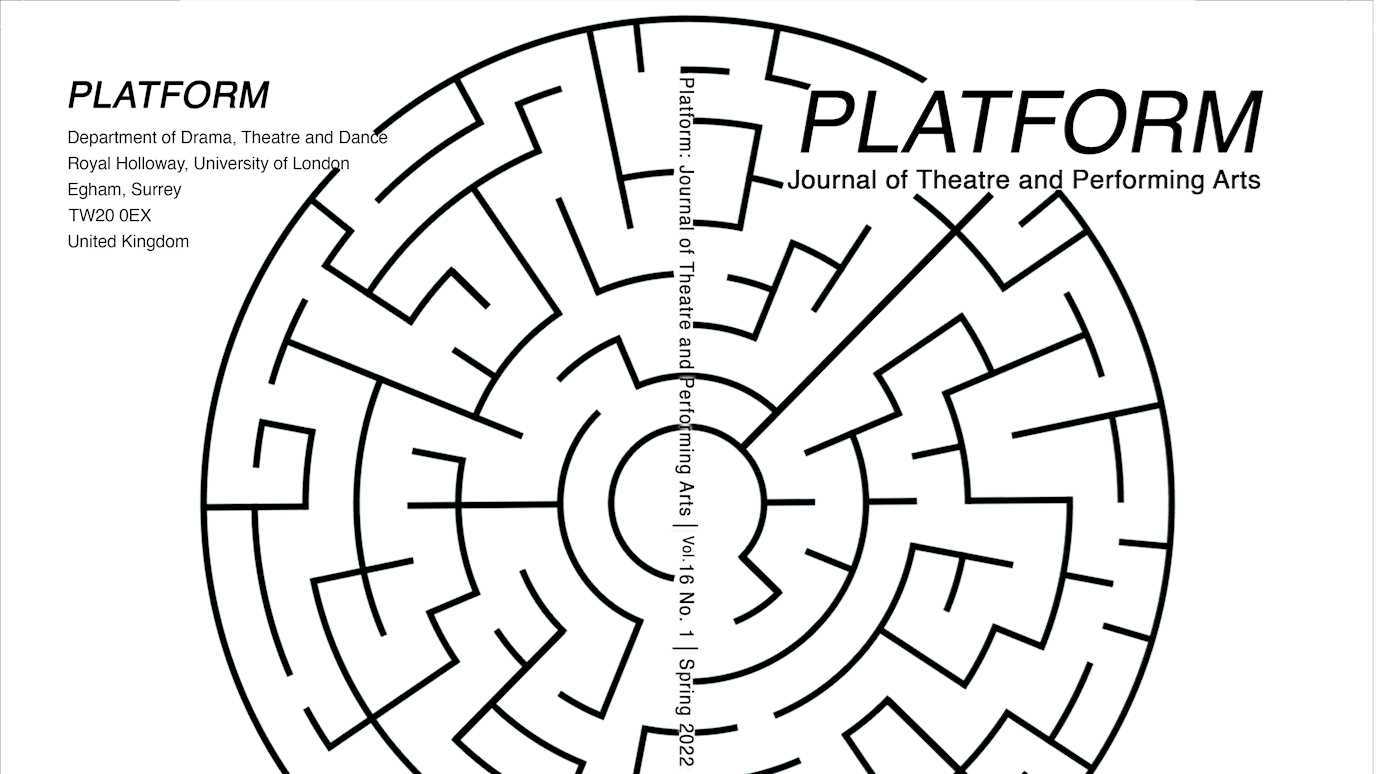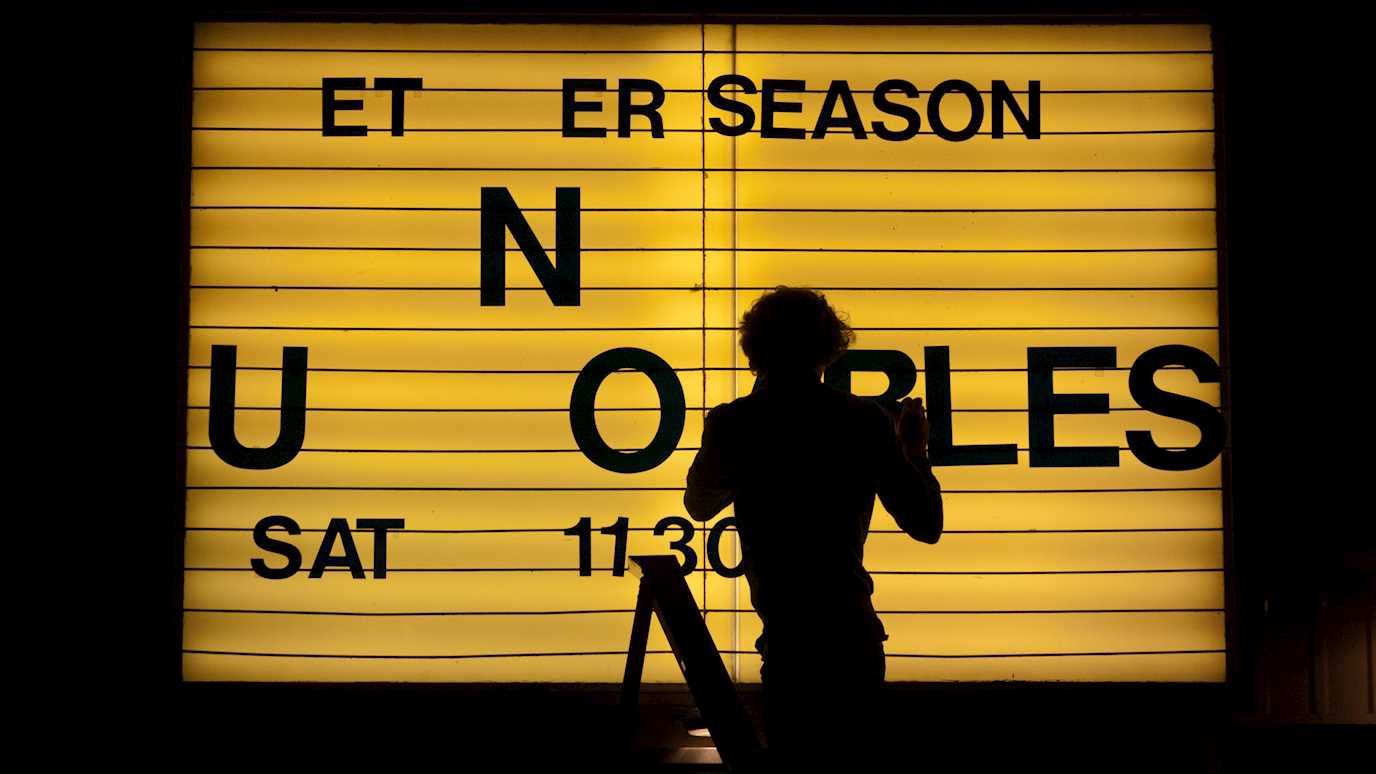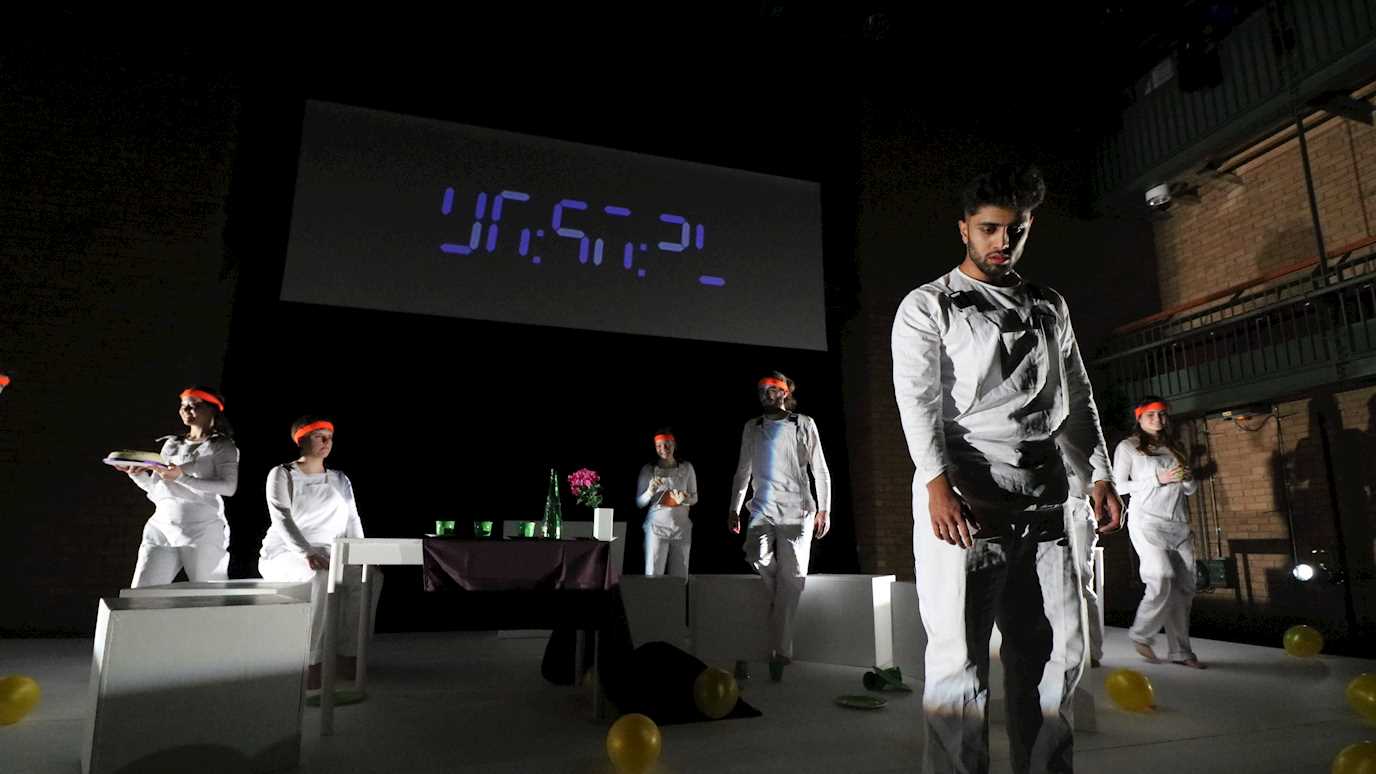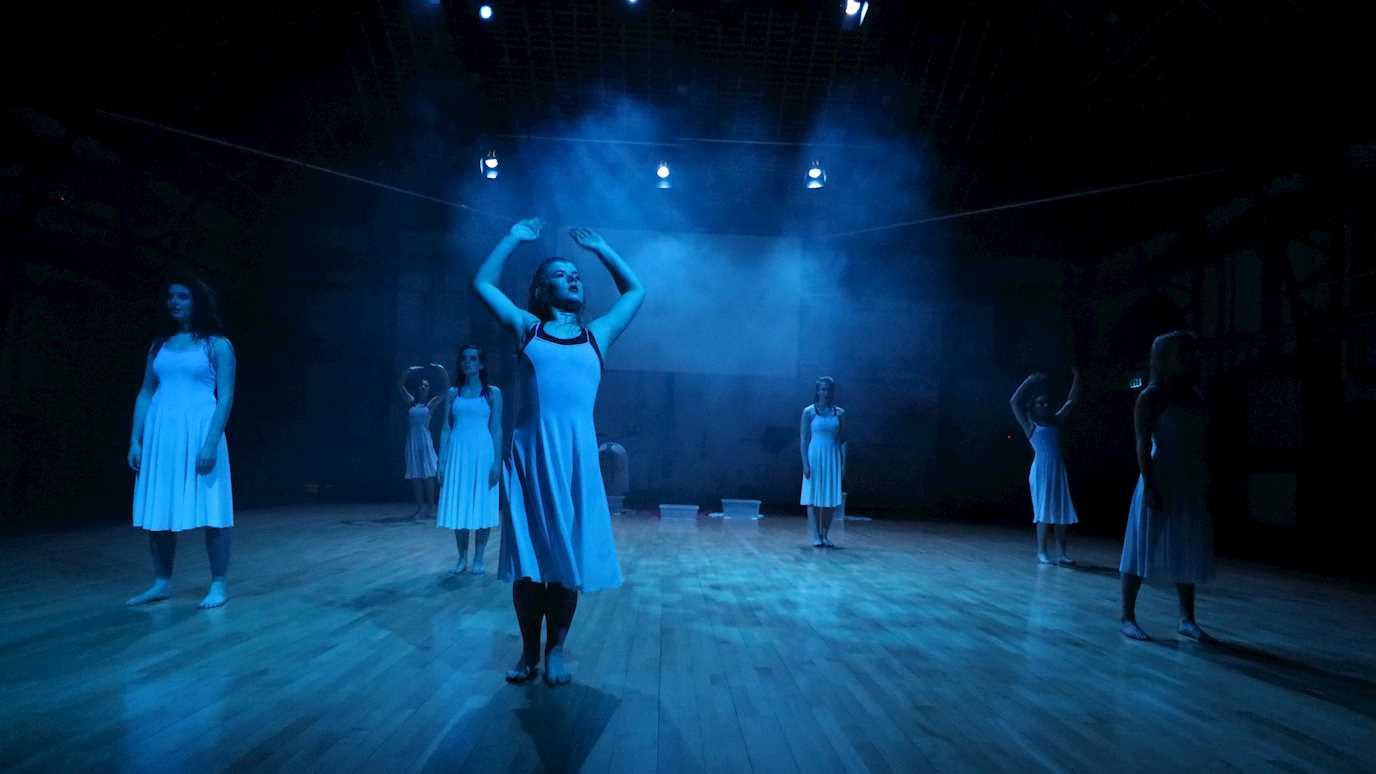Platform is a refereed journal that has been devoted to publishing the work of postgraduates, postdoctoral researchers, and entry-level academics in the fields of theatre and the performing arts for more than a decade.
Platform, as the name suggests, works to provide a space for postgraduate researchers and entry-level academics to have their work circulated through online publication. Each edition also has a limited print run in full colour.
The journal is run by postgraduate researchers and operates a peer and academic review system, which ensures that contributors not only have the opportunity to publicise their research, but also receive valuable feedback.
Platform is published twice a year, with each edition following a broad theme, making it possible for diverse research interests to be covered in each volume. Platform explicitly welcomes interdisciplinary work and submissions not only from scholars of theatre, performance, and dance, but also from those working in related disciplines whose work speaks to our calls for submissions.
Editorial Board
Jon Berry
Co-editor
Jon Berry is a playwright and researcher currently based at Royal Holloway, University of London. His academic work centres around contemporary metaphysics of theatre looked at through the work of Deleuze and Guattari, with a particular interest in the ontology of the political in Welsh 21st-century plays. He is currently researching the autonomy of plays in political life outside of the human, as well as a small note on the notion of the ‘real world’ in theatre scholarship. His plays have been performed across the UK, and he has been awarded with a Theatre503 503Five award.
Chris Green
Co-editor: The Future (Platform 17:1)
Chris Green is a lecturer in performance at Edge Hill University and an artist who works under the name greenandowens with Katheryn Owens. They recently passed their viva for their fully collaborative, co-authored practice research PhD at the University of Plymouth. This research is centered on experiences of millennial precarity, drawing on philosophies of hauntology and lost futures (published in Performance Research and Studies in Theatre & Performance). Their work is due to be published in the ‘On Care’ edition of Performance Research and in the book Rethinking Barthes through Performance. They are also in the process of developing new research on friendship, leisure, and performance.
Milo Harries
Co-editor: Gatherings (Platform 17:2)
Milo Harries is a PhD candidate at the University of Cambridge, writing on dramaturgies of encounter in the context of the climate crisis. His work has appeared in Critical Stages/Scènes Critiques, CTR, Platform, and IJPADM. Milo is also an opera singer and coach, and has worked at the Royal Opera House, Glyndebourne, and Opera North (see www.miloharries.com).
Grace Joseph
Co-editor: Gatherings (Platform 17:2)
Grace Joseph is a theatre director, access worker, and PhD researcher at Goldsmiths, University of London. Her practice-based PhD is shaped by ongoing collaborations with disabled-led theatre companies, and interrogates the aesthetics of access in both rehearsal and performance. At Goldsmiths, she co-convenes the Performance Research Forum, the Department of Theatre and Performance’s public research event series. As a theatre director, Grace has trained at the Young Vic, worked at Shakespeare’s Globe and Hampstead Theatre, and developed new writing with Camden People’s Theatre and Battersea Arts Centre. She has directed and lectured at Drama Studio London and Central School of Speech and Drama, and has a Level 3 in British Sign Language.
Katheryn Owens
Katheryn Owens is an artist-academic who works under the name greenandowens with Chris Green. They recently completed the viva for their co-authored practice-research PhD titled ‘Performance Writing, Objects and Millennial Precarity: a co-authored PaR exploration between friends’ at the University of Plymouth, UK. Their research is centred on experiences of millennial precarity (housing, labour, time), drawing on philosophies of hauntology and lost futures (published in Performance Research and Studies in Theatre & Performance). Central to this research is the potentiality of friendship, hospitality and art making as ways to reimagine the future and how producing slow forms of object making and DIY practices fit into this. Their performance writing practice often takes the form of walks, sound, text-based scores, craft, and zines. In 2022 they were commissioned by the Whitworth to make Borderlines, a walking performance exploring queer hidden borders in the city of Manchester as part of a Suzanne Lacy retrospective. Katheryn works as an associate lecturer and in hospitality; the experience of which is reflected in the research.
Amy Terry
Amy Terry is a theatre-maker and practice-based PhD candidate at Royal Holloway, University of London. They hold an MA in Text and Performance from RADA/ Birkbeck. Their current research focuses on postdramatic playwriting methodologies as an intersectional way of working for queer, trans*, and working-class practitioners. As a writer and performer, they have presented work at Camden People’s Theatre and are in the process of creating a queer touring show in association with Farnham Maltings. They are currently the dramaturgy mentor for Gabriel by Clare Bayley, a collaboration between University College, Oxford and Oxford Playhouse.
Laura Vorwerg
Laura Vorwerg is a visiting lecturer and doctoral researcher at Royal Holloway, University of London and has previously worked as a director, assistant director, and staff producer in opera and theatre. Her research explores the relationship between performer training and interdisciplinary performance practice within theatre and opera and seeks to examine the ways in which embodied physical skills are taught, learnt, maintained, and adapted within professional practice. Laura has contributed chapters to Interdisciplinary Arts: Contemporary Perspectives, published by the University of Malta Press, and Time and Performer Training, published by Routledge.
Further information
Editorial Advisory Board
Members of the Editorial Advisory Board are internationally renowned and you can view their profiles and contact information by clicking on the name of the person(s) you are interested in.
Board members
| Mojisola Adebayo | Queen Mary, University of London |
|---|---|
| Adam Alston | Goldsmiths, University of London |
| John Bull | University of Reading |
| Diana Damian Martin | Royal Central School of Speech and Drama |
| Maria Delgado | Royal Central School of Speech and Drama |
| Helen Gilbert | Royal Holloway |
| Patrick Lonergan | National University of Ireland, Galway |
| Chris Megson | Royal Holloway |
| Helen Nicholson | Royal Holloway |
| Sophie Nield | Royal Holloway |
| Dan Rebellato | Royal Holloway |
Past Board Members
Past members of the editorial board include:
| Tamara Aberle | Lianna Mark |
| Adam Alston | Joe McLoughlin |
| Vicky Angelaki | Lisa Moravec |
| Chloe Arros | Siobhan O'Neill |
| Rachel Clements | Emer O’Toole |
| Poppy Corbett | Eugénie Pastor |
| Meg Cunningham | Julia Peetz |
| Diana Damian | Grant Tyler Peterson |
| Sylwia Dobkowska | Brahma Prakash |
| Gwyneth Donlon | James Rowson |
| James Ellison | Adam Rush |
| Marissia Fragkou | Will Shüler |
| Philip Hager | Clio Unger |
| Kene Igweonu | Alex Watson |
| Josephine Leask | Raz Weiner |
| Mara Lockowandt | Marilena Zaroulia |
| Catherine Love |
Contact us/Subscribe
For any further information please contact the editors at platform-submissions@rhul.ac.uk.
To keep up to date on our launches, events, and calls for papers, join our Facebook page or follow us on Twitter.
You can also contact us via mail at:
Platform
c/o Department of Drama, Theatre and Dance
Royal Holloway, University of London
Egham, Surrey TW20 0EX
United Kingdom
Subscribe
Subscribing to our mailing list means that whenever a new issue is published or a fresh call for papers goes out, you will be notified by email. We will not pass on your email address or use it for any other purpose other than as indicated without your consent.
You can join our mailing list simply by sending an email with the words JOIN LIST as the subject, including your name(s) and university affiliation to:
platform-submissions@rhul.ac.uk
You can also unsubscribe at anytime by sending an email with the words EXIT LIST to the same address.
























